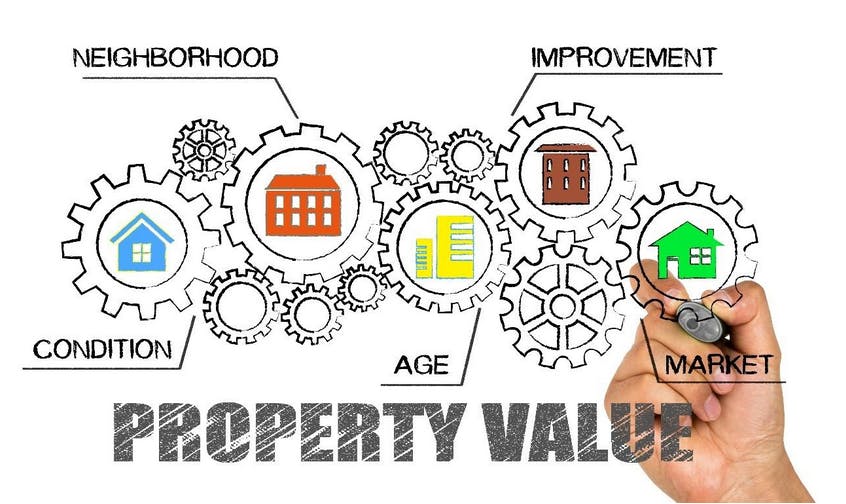Not all home appraisals – and those who conduct them – are created equal.
The home is under contact, seller and buyer have agreed to terms. Buyer is financing the purchase through a mortgage lender and the underwriter wishes to confirm the value of the home before issuing the loan. (No lender will approve a mortgage on a home that is valued less than the agreed sales price.)
Enter the appraiser, someone who has probably never visited the property – or possibly even the neighborhood – and who will use his/her expertise to develop a valuation on the home. Most appraisals are quick and easy with a valuation at or above the agreed price, but a so-called low appraisal can torpedo a sale and possibly lead to a relisting of the home – a step no owner wishes to take.
About 13% of appraisals came in below the contract price this August, the most-recent available data, according to housing-research firm CoreLogic. That’s off the recent high of 20% in May when buyers were in a feeding frenzy for scant homes. CoreLogic said the more typical figure for low appraisals in the U.S. housing market is 7% of all mutually accepted contracts.
This is one of the rare moments when sellers and buyers are united in declaring their mutually agreed price is fair and accurate for today’s housing market. After all, both parties want a positive outcome from the appraisal. (Home Appraisal Tips for Buyers)
Sellers, with assistance from their real estate professional, can help lessen the chances of a low appraisal by following some important steps before marketing the home. They include:
- Have an independent contractor, home inspector and/or listing agent tour the property and welcome suggestions to improve the place. Are the appliances and heating sources less than 10 years old and in good working order or could one or two be repaired or replaced?
- Take steps to improve curb appeal. This can include a full range of updates, from landscaping, painting, roofing and more.
- Declutter and organize areas of the home that feel cramped and hiding some of the home’s charm. An appraiser won’t penalize a homeowner for having too much stuff, but it could cover up some of the beauty – hardwood floors, working fireplace or bonus rooms turned into storage areas – and hide some intrinsic value.
- Discuss price with your agent before listing. Your real estate pro will know the true market value of the home based on recent sales of similar homes in the area. Take this person’s advice when determining list price. Unless all-cash bids are certain (avoiding the lender’s appraisal), there are few reasons to list – and receive – a high price for the home if the appraiser submits a valuation much less, sending seller and buyer back to square one.
Just before the appraiser visits the property, sellers should follow similar guidelines when they prepared the home for Day One of the listing. That includes making the home presentable – even if preparing to move (hide those packing boxes!) – because you never know if the home will sell at the agreed price. Beds made, house clean, lights on, yard right? The appraiser expects the home to be empty of animals, occupants and real estate agent/brokers. (He/she has access to the same house keys as real estate agents.)
It should be noted that lenders do not directly hire the appraiser. A third-party company recruits and hires the person, and he/she can be local to the city, county or state. They could be specialists in condos, townhomes, regions of the state, rural property (with septic systems, wells and outbuildings) or of urban-zoned homes. Which appraiser arrives at the sellers’ home is left to the hiring company and the planning of available people that day. Yes, it can be a little bit of a crapshoot, to be honest, with who appraises the home. (Yes, “crap!” and “shoot!” may be two words a seller and buyer shout if the appraisal is too low.)
That makes it even more critical to follow the above suggestions and to allow your real estate agent to check on the property just before the home is visited by the appraiser. Sharp agents will not only introduce him/herself to the appraiser on the phone but will also offer to share comparable home prices to help explain both the list and agreed home prices.
Agents, like me, often deliver a package of information to help justify the price. We, after all, work with buyers and sellers every day and are experts when it comes to current market conditions. Most appraisers, while remaining independent and unbiased, welcome the free research, particularly those unfamiliar with the area or uncertain about aspects of the property.
To put a fine point on it, sellers should understand that while the home has a happy new owner in waiting the property still must pass this independent review. Without a well-presented home, plans for a smooth transition from seller to buyer can go wrong. (There are remedies in this sour scenario and they are discussed in a separate blog post.)
Owners should confer early and often with their listing agent to ensure the home is ready for this big test. Agents, when on their toes, can be advocates for their sellers at this important, sometimes-overlooked stage. Only when an appraisal meets or exceeds the agreed price can a seller celebrate and complete their plans to move.




